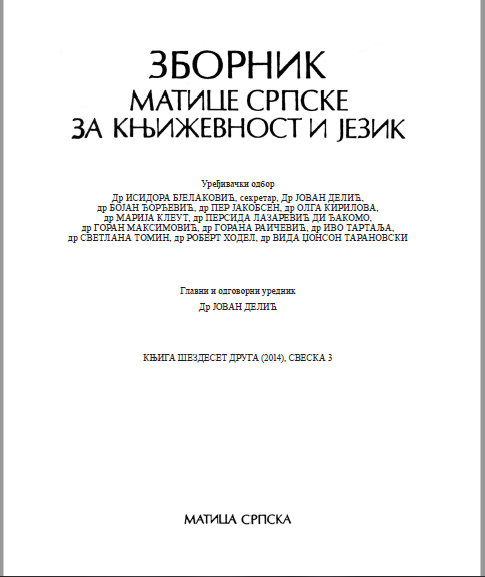МОТИВ ВУКА У ВУЧЈОЈ СОЛИ ВАСКА ПОПЕ
THE WOLF MOTIVE IN POPA’S WOLF’S SALT
Author(s): Milomir M. GavrilovićSubject(s): Serbian Literature, Theory of Literature
Published by: Матица српска
Keywords: Wolf's salt; Serbian literature; Vaska Popa;
Summary/Abstract: Wolf’s salt represents autonomous poetic formation that corresponds to mythical foundations, but also transcends initial context and derives an independent symbolism and significance from the myth. Popa used initial mythical postulates and relations as a pathway for substantiation of universal and divergent meaning, reshaping the pre-Christian myth of Serbian supreme god and using elements from the old Serbian mythology and religion. Two central themes are closely related in this collection: origination, creation as a constitutional principle of the formation of the cultural identity, and preservation of identity both individual and collective. From the cosmological to the individual proportion, creation as well as the protection of individual and collective self-expression is a main character’s basic need for self-affirmation - from a lame wolf to a wolf’s bastard. Through the triumph of endangered individual, as well as the collective identity, the Wolf’s salt thematizes the supremacy of life-giving principle over destruction. Characters of wolf’s protectors surpass mythical roles in the cosmogonist performance and also represents symbolic framework of these far-reaching values: Wolf’s salt is based on the myth, but it surpasses representing substantial commentary on essential poetic themes: creation and preservation of cultural (and existential) continuity and identity.
Journal: Зборник Матице српске за књижевност и језик
- Issue Year: 62/2014
- Issue No: 3
- Page Range: 779-796
- Page Count: 18
- Language: Serbian

